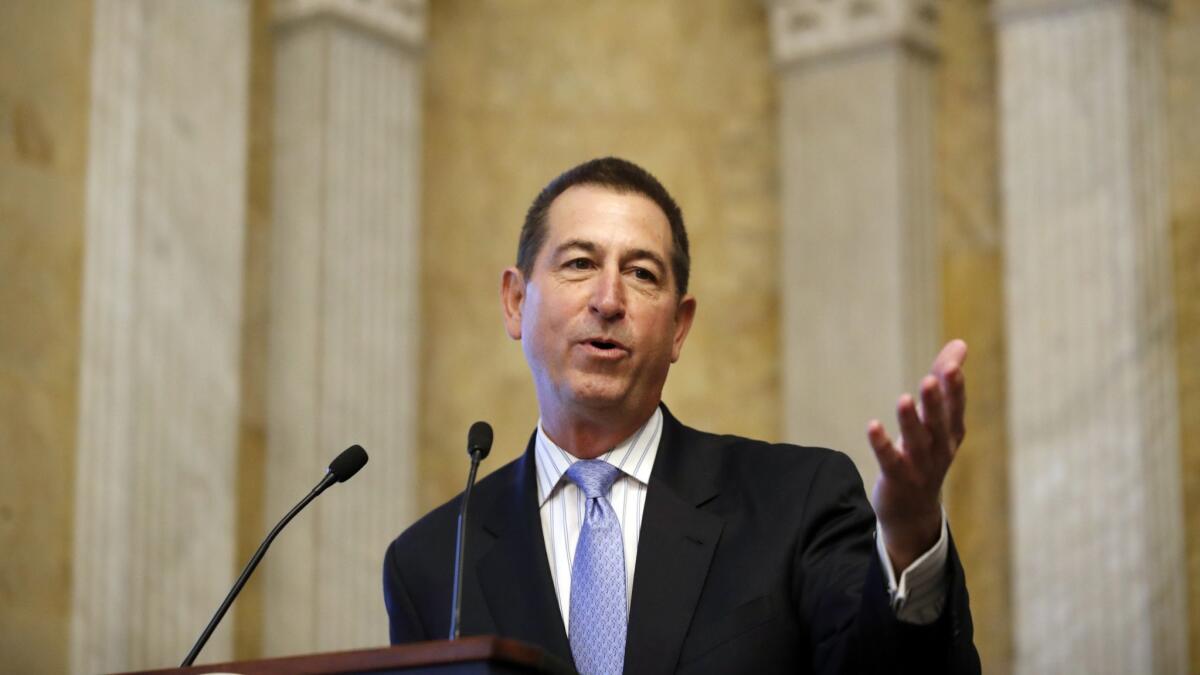Wall Street may have to lend more in poor areas under new rules

- Share via
Wall Street banks and regional lenders could see an increase in the $250 billion they have to spend annually to meet U.S. requirements for doing business in lower-income communities as regulators prepare to overhaul the Community Reinvestment Act.
The changes set to be proposed Thursday by the Office of the Comptroller of the Currency and Federal Deposit Insurance Corp. would increase demand for lending by big banks, the regulators say, but they would get pre-approved lists of qualifying activities that could eliminate a lot of the guesswork that is currently required.
“The larger banks should welcome this, and it should allow them to do more in the communities in which they operate,” said Office of the Comptroller of the Currency chief Joseph M. Otting, a former banker who has made rewriting CRA his top agenda item at the agency.
The 1977 law, meant to encourage lenders to extend credit in lower-income areas, hasn’t been updated since the rise of the internet and online banking. Banks are graded on how well they’re meeting expectations, and those scores are considered by regulators when lenders seek to open new branches or make acquisitions.
The new proposal would test banks differently, requiring that they exceed goals both at the company level and in most of their geographic assessment areas. And the assessment areas would no longer be based just on physical location but on concentrations of customers — a major development for online lenders and those backing away from branch networks. A bank that has a lot of customers in an area far away from its physical location could also have to meet CRA requirements in that other area.
Otting said in an interview that a lot of time has been devoted to the proposal, which he called a “good framework” that will increase credit opportunities for poor people, family farmers and residents of Native American reservations.
One potential complication is that the Federal Reserve isn’t expected to sign on to the proposal with the Office of the Comptroller of the Currency and FDIC, leaving a potential split in how CRA would be overseen. Randal Quarles, the Fed’s vice chairman for supervision, was careful to underline in congressional testimony last week that his agency has contributed to the proposal effort, even if it doesn’t sign on, and it hopes to join in a final rule.
For his part, Otting shrugged off the Fed’s reticence, noting that about 85% of CRA investment and lending is done in banks overseen by the OCC and FDIC. The industry spent $482 billion to meet CRA demands in 2017, according to the OCC, with about half of that coming from the Wall Street and big regional banks.
The overhaul effort has drawn controversy ahead of the proposal’s release, with Democratic lawmakers and consumer groups expressing concern that Trump-appointed regulators want to water down CRA requirements. House Financial Services Committee Chairwoman Maxine Waters (D-Los Angeles) said in a statement Thursday that she would lead a group of Democrat lawmakers to the FDIC meeting to show “we are very carefully monitoring their activities.”
“It is critical that the banking regulators do not jam through their proposal without giving the public ample time to weigh in, or without coordinating with the Federal Reserve,” Waters said, citing a worry that the changes “will make it easier for banks to pass their CRA exams, weakening their obligation to responsibly serve communities across the country.”
An industry lobbying group, the Consumer Bankers Assn., called the overhaul a “generational opportunity,” with President Richard Hunt saying in a statement that the OCC and FDIC deserve credit “for tackling this herculean effort and working with banks, community groups and other stakeholders to get it right instead of simply getting it done.”
Under the proposal, which will be opened for a 60-day public comment period, banks would be given some time to transition to the new rules, and the smallest lenders would be able to opt out.
Also Thursday, the FDIC board was set to vote on a proposal to make sweeping changes to the oversight of brokered deposits, a topic especially relevant as fintech firms handle more and more of people’s money. FDIC Chairman Jelena McWilliams said this week that the current system has left an inconsistent and uneven treatment of third-party deposits in U.S. banking, and that regulators’ sluggish response could get in the way of innovation.
More to Read
Inside the business of entertainment
The Wide Shot brings you news, analysis and insights on everything from streaming wars to production — and what it all means for the future.
You may occasionally receive promotional content from the Los Angeles Times.










